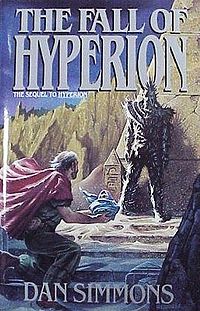Hyperion by Dan Simmons
 After years of hearing "Hyperion is the bestest book evar!", I finally managed to read it. And frankly, it is pretty good.
After years of hearing "Hyperion is the bestest book evar!", I finally managed to read it. And frankly, it is pretty good.
Set in the far future where humanity has created The Hegemony of Man, a culture that spans many planets thanks to portals ("farcasters") that have openings many light-years apart. But there are some (the "Ousters") who live in fleets of deep space vessels around the edges of the Hegemony. As the story opens, the Ousters have launched an attack on the planet Hyperion, not part of the Hegemony proper but under its control and a vital part of many hidden plans. Against this backdrop 7 pilgrims are thrown together on a religious quest to the Time Tombs, mysterious structures on a remote part of Hyperion haunted by an even more mysterious (and murderous) creature - the Shrike.
Trying to summarize all of Hyperion's tortured plot-lines would be fruitless - there is a lot going on. But the frame story mainly concerns the difficult pilgrimage across the planet. The pilgrims initially do not know each other and the bulk of the book is made up of each pilgrim telling their own story to the others in their own words as they travel. It turns out that far from being totally random each pilgrim has a reason for wanting to go to the Time Tombs and some even wish to meet the Shrike. But are they all telling the truth?
Hyperion is basically review-bait - filled with pretentious literary allusions, most of which probably went over my head. Its structure borrows from Chaucer, but it is also clearly influenced in a big way by the poetry of Keats, but to say more would be to spoil things. If nothing else it forced me to spend an hour or two on Wikipedia trying to educate myself. The stories are all told in different styles, and information is cleverly conveyed so that by the end of the book the reader thinks they have a good understanding on the way in which the universe works.
That said, Hyperion has one massive flaw. By the last chapter we have heard all the stories and now expect to see how they all turn out. But instead the book ends right as the pilgrims start their final walk down the valley to the Time Tombs. This is rather a slap in the face to the reader - I felt cheated and resolved not to buy the sequel just to spite the author.
The Fall of Hyperion by Dan Simmons
Ok,  obviously I failed in my resolve - but in my defense I found it at a secondhand book store so the author gets nothing from my purchase.
obviously I failed in my resolve - but in my defense I found it at a secondhand book store so the author gets nothing from my purchase.
The Fall of Hyperion starts where the previous book so rudely left us but switches gear completely, focusing on what is happening back in the Hegemony as what they thought would be an easy defense of the far-flung planet turns into a fight for survival. The Hegemony is politically fractured, and different groups are scheming for mysterious ends. The CEO of the Hegemony has her own plan involving the pilgrims but she is not the only one.
The Fall of Hyperion sets itself a mammoth task of tying up all the loose ends of Hyperion while telling a fairly convoluted story itself. It is to Dan Simmons' credit that it pretty much succeeds, although it does get somewhat incoherent at times. The huge audacity of the explanation for some of the strange goings on is almost worth the price of admission itself, most books that try something similar just spin out of control but The Fall of Hyperion comes as close as any to drawing everything together satisfactorily.
The writing in both books is good, and the story moves along at a good pace. The way that certain events and even assumptions about the Hegemony itself are portrayed different depending on the point of view of whichever character the book is following at the moment is particularly well done. There are a few unrealistic points - it seems that just about everyone in the far future has a working knowledge of Keats' poetry, but they don't mar an excellent series.
Highly recommended if you like this sort of thing but for goodness sake make sure you obtain both books and read them in order. Hyperion doesn't have an ending, and The Fall of Hyperion makes no concessions to readers who haven't read the first book.